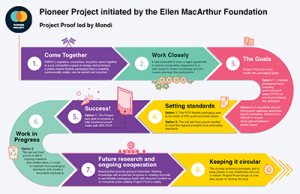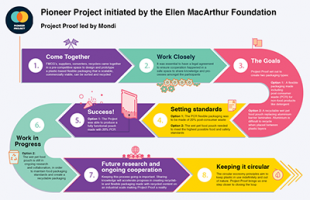 Italy : Mondi Group led Project Proof has developed a usable pouch prototype containing 20% post-consumer waste bringing flexible packaging one step closer to a circular economy. The pouch is suitable for packaging household products such as detergent.
Italy : Mondi Group led Project Proof has developed a usable pouch prototype containing 20% post-consumer waste bringing flexible packaging one step closer to a circular economy. The pouch is suitable for packaging household products such as detergent.
Project Proof is facilitated by the Ellen MacArthur Foundation (EMF) and is part of Mondi’s commitment to the Ellen MacArthur New Plastics Economy Initiative.
The Project Proof is focused on designing products in line with circular economy principles and has shown that it is possible to use unclean and raw post-consumer recycled content to create new flexible packaging. Mondi will now develop the prototype further to ensure it can be rolled out as a commercially viable product for its multinational FMCG customers. This will support Mondi’s work as a signatory of the New Plastics Economy Commitment to ensure a minimum of 25% of post-consumer waste is incorporated across all its flexible plastic packaging where food contact regulations allow by 2025.
Georg Kasperkovitz, CEO Mondi Consumer Packaging, says, “We believe that working in partnership is key to finding a solution for plastic waste by driving innovation and broad systemic change throughout the plastics value chain with a focus on replacing, reducing and recycling.”
The Group’s customer-centric approach, EcoSolutions, is helping customers to achieve their sustainability goals by focusing on packaging that is sustainable by design – paper where possible, plastic when useful.
“We wanted to see what was possible with the worst input, and we were able to create a fully usable prototype” explained Graeme Smith, Mondi Consumer Packaging’s sustainability manager. “This proof-of-concept underlines the potential what could be manufactured when better quality, pre-sorted materials are used as input. Better waste collection mechanisms and a focus on packaging designed for recycling will improve this process and help close the sustainability loop.”
The first phase of the project successfully produced a prototype made with a minimum of 20% post-consumer waste. The second part of Project Proof focused on long-life food pouches.



